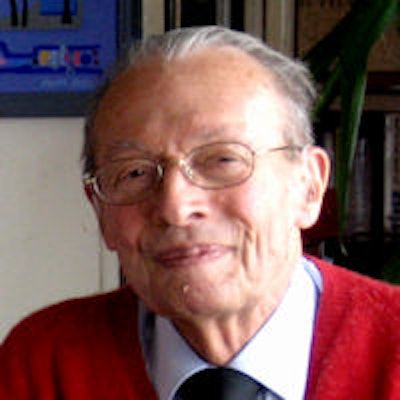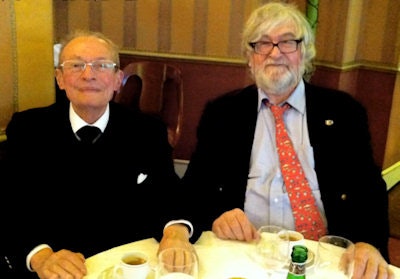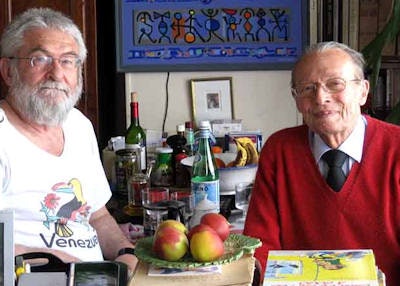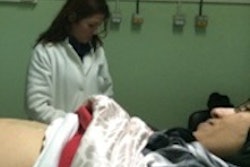
Colleagues and former students of Dr. Jacques Gillet, who died on 27 August, have issued glowing tributes to a true pioneer who established the School of Radiology at the University Hospital of Rabat in Morocco.
Born in 1923, Gillet trained and qualified as a radiologist in Paris, but after being tempted by a tourism poster vaunting the charms of Morocco, he moved to the country in 1955. After a brief period in Marrakech and then Meknes, he became head of service at Avicenna (Ibn Sina) Hospital in Rabat in 1956.
"Over two decades, Jacques Gillet created the original temple to university hospital radiology in Morocco by using the best of French, Swedish, and American schools of clinical radiology," said Dr. Jean-François Moreau, emeritus professor of radiology at Université Paris Descartes and honorary chairman at Hospital Necker Paris, who was a regular visitor to the radiology department in Rabat and a close friend of Gillet.
 In 2011, the French Society of Radiology awarded a Medal of Honor to Dr. Jacques Gillet for his exceptional contribution to radiology. Here, Gillet (left) dines with Dr. Jean-François Moreau. All images courtesy of Dr. Jean-François Moreau.
In 2011, the French Society of Radiology awarded a Medal of Honor to Dr. Jacques Gillet for his exceptional contribution to radiology. Here, Gillet (left) dines with Dr. Jean-François Moreau. All images courtesy of Dr. Jean-François Moreau."He managed to obtain modern equipment for his department through his time and effort with the Moroccan Ministry of Health, equipment which he ensured functioned on a full-time basis. In addition, he created the emergency radiology rota and became renowned for emergency imaging himself among the interns," Moreau added.
Finding himself the only radiology teacher in the hospital, Gillet championed the discipline and soon converted many male and female students to it. He organized lectures and practical training for his students in Rabat, and in a manner similar to the agreement that existed between Casablanca and Nancy, he sent them on long internships to Centre Hospitalier Universitaire (CHU) Paris. Several of his students went on to become heads of service, then professors. Among them were Dr. Farida Imani, president of the 2008 International Congress of Radiology, which took place in Marrakech, and Dr. Abdelhafid Sbihi, a renowned pediatric radiologist.
"I have always considered Dr. Gillet to be my professional father and I always will," Sbihi told AuntMinnieEurope.com. "The memory of Dr. Jacques Gillet will remain alive forever in Morocco. I knew him, like many future doctors in 1968 when he was an emergency doctor at Avicenna Hospital, part of CHU Ibn Sina in Rabat. He came regularly to the emergency service, day and night, and shone a light for all. An excellent and very human radiologist and doctor, and a brilliant teacher, he represented the ideal manager. I discovered his great teaching abilities during radiology training sessions during my third and fourth year as a medical student. His presence, empathy, his immense knowledge, his kindness towards others, the respect that he gave to and inspired in all persons working at CHU, and his charisma made him extraordinary."
"My 'spiritual father' has guided my radiological education in Rabat and Boston, and my career in radiology," Sbihi continued. "He treated all future Moroccan radiologists with the same generosity, watching over their development in different subspecialties, and that of the technicians at the radiographers' school, which ensured the existence of good radiology in the most remote areas in Morocco. He was also a member of the technical commission in the Ministry of Public Health charged with choosing adequate equipment and ensuring its maintenance, and in addition to this enabled Moroccan radiologists to access the latest technological advances."
According to Moreau, Gillet was "the opposite of an enslaving colonizer."
"He was devoid of any authoritarian tendencies, a doctor in the greatest Hippocratic tradition, an excellent diplomat, a highly cultivated multilinguist, and a freethinker who believed in the equality of faith, race, or sex. He was bestowed with a natural authority in all the professional paths that he trod or pioneered," he commented.
As a visiting professor to Gillet's faculty of radiology in Rabat on many occasions, Moreau was able to develop a long-standing friendship with Gillet. In his own personal tribute on his blog, www.jfma.fr, Moreau captures the essence of a man whom he considered was as humble as he was great.
 Gillet (right) and Dr. Jean-François Moreau were close friends for many years.
Gillet (right) and Dr. Jean-François Moreau were close friends for many years."Until his retirement and return to France in 2000, he remained mentor to each and all, a figure to whom they would refer in moments of doubt, and who would rejoice in their success. He was the clear-sighted tutor who could detect talent and at times of hesitation could show his protégés how to move forward," he wrote.
In addition to Imani and Sbihi, Moreau lists many such protégés, including "spiritual" daughter neuroradiologist Dr. Najat Boukrissi, plus head of service at an international hospital in Rabat Dr. Mohammed Cherkaoui, as well as 500 technicians whom he personally trained in a school that he created in 1967.
"Dr. Gillet was one of my first mentors at medical school in Rabat and certainly had a great impact on my choosing the field of radiology as a specialty and a way of life, as he had on many of my Moroccan colleagues," noted Dr. Latifa Sanhaji Gharbaoui, assistant professor of radiology at the University of Texas Medical School at Houston. "His dedication to patients and his enthusiasm for teaching were highly contagious. He was our role model as a physician and radiologist, an inspiration to several generations of Moroccan radiologists. He will always be remembered as a kind and happy man, a compassionate physician, an enthusiastic radiologist and teacher, the father of Moroccan radiology. We will miss him."
Invited by the king of Morocco to attend independence celebrations each year, he was promoted to the rank of Grand Officer of Ouissam Alaouite, the highest rank accorded to a foreigner in Morocco. In France, he was awarded the blue rosette of the National Order of Merit and Academic Palms. In 1980, the National Circle of Radiology Teachers (CERF) in France recognized the value of his work and created for him and two colleagues (Drs. José Rémy and Jacqueline Vignaud) the perennial title of associate member. In 2011, the French Society of Radiology (SFR) awarded him a Medal of Honor for his exceptional contribution to radiology.
"Those who had the honor of belonging to his circle of friends already know of his loyalty, generosity, warmth, love of life, and enduring health. Attacked by cancer two years ago, his stoicism and lucidity accompanied him, even in his final hours," Moreau said.
His funeral took place on 3 September at Saint-Pierre du Gros Cailloux in Paris.



















